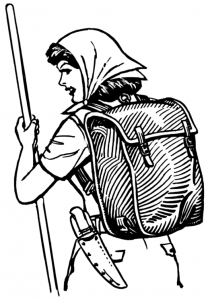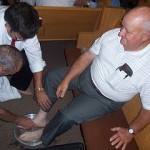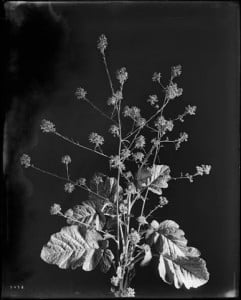
A reflection on the lectionary readings for Sunday, July 5th
In the spring and fall and sometimes the summer my wife and I love to go backpacking. We enjoy the quiet of long miles on the trail, the beauty of God’s creation, and the simplicity of living from a backpack. But if we admit it, another pleasure of backpacking is getting outfitted for the trip. Before we head to the woods we lay out our equipment, an array of compact and lightweight items to provide a level of comfort for the journey. There are collapsible bowls, compact-cooking stoves, lightweight hammocks, eating utensils made of recycled airplane metal. If something is missing, then it presents an opportunity to head to REI with aisle upon aisle of tempting gear, from bracelets containing 100 feet of rope to swivel chairs that collapse to the size of a Coke bottle.
What we bring all depends, of course, on what kind of trip for which we are being outfitted. In some instances we make sure we have plenty of rain gear, in others we want a warm sleeping bag for cold nights, and at other times just a thin sheet and sleeping pad will do. Whatever the conditions our goal is to be independent for a few days—to be able to hike and survive in the woods without the need of a vehicle, a house, electricity, or a bathroom.
In our gospel reading today we find Jesus outfitting his disciples for their own kind of expedition. But unlike a backpacking trip, or even the kind of multiday journey that would have been common in Jesus’ day, the packing list Jesus provides is not one that will produce independence. Jesus is outfitting his disciples for a journey of dependence—dependence on the hospitality of strangers, dependence on the power of God.
We don’t value dependence in our society. Just yesterday, we celebrated Independence Day and though the kind of national independence it marks can be good and worthy of praise, it also represents a value in our society that is not always so sanguine. As the writer Shane Claiborne says, “independence and individualism have come at a great price. In the wealthy and industrialized countries we have become the richest people in the world, but we also have some of the highest rates of loneliness, depression, and suicide. We are rich, sad, and lonely. We are living into patterns that not only leave much of the world hungry for bread and starved for justice but also leave us longing for the good life and for meaning and purpose beyond ourselves.”
Jesus offers a different way. “He ordered them to take nothing for their journey except a staff; no bread, no bag, no money in their belts; but to wear sandals and not to put on two tunics.” Can you imagine traveling without money or supplies or food? This was a journey that forced the disciples to rely on hospitality—they were to be nothing more or less than beggars and as such they were creating the possibility of charity and hospitality wherever they went. While Jesus was rejected in the community in which he grew up, he answers that rejection by creating a new, alternative community through this sending of his disciples.
In each place they enter, the disciples come first with the gift of their neediness. When welcomed they then use that gift to bring healing, but this can only happen when they are welcomed and a new community is formed. It is this training that ingrains in the disciples the habits of life that will become the first church in Jerusalem, a place described in the book of Acts as a place where “no one claimed private ownership of any possessions, but everything they owned was held in common.” A place where “there was not a needy person among them.”
That is what happens when we show up with our dependence, with our neediness and are welcomed with hospitality. Our neediness disappears when we allow ourselves to move into a community of sharing. But this community is impossible when we come claiming independence and individualism. It is only when we journey in dependence that we can also discover where real power comes from.
Paul knew something of this. Like the disciples, outfitted with neediness, Paul has found that his own missionary journey has been one in which he is weak rather than strong, dependent rather than independent. In 2 Corinthians Paul talks about a thorn “given me in the flesh.” There has been much debate about what this thorn might be. It could have been a problem with Paul’s eyes, it could have been some other bodily malady. We will never know exactly what it was, but what we do know is that it made Paul weak. It made Paul call on God. And when he asked that this painful, needy wound be removed he heard God say, “My grace is sufficient for you, for power is made perfect in weakness.”
In the upside down Kingdom of God Paul finds that his greatest asset is his lack, his weakness, his dependence upon Christ for everything. So rather than showing his strength to survive on his own, he writes “So, I will boast all the more gladly of my weaknesses, so that the power of Christ may dwell in me.”
Do you hear that “so”? In the Greek of the New Testament this is the conjunction ἵνα. It means “so that,” “in order that.” Paul is indicating here that if you want the power of Christ to dwell in you, you need to accept your weakness. You need to embrace your dependence. We are not self-sufficient gods, we are creatures who must rely on others for the goods of our lives. If you want an example just remember this: we all rely on food grown from dirt. Three times a day, we have an opportunity to admit we are not so independent after all. And yet, many of us still claim our independence.
“For we have had more then enough of contempt, too much of the scorn of the indolent rich, and of the derision of the proud.” The Psalmist pulls no punches. Who are these indolent rich the Psalmist is speaking of? It is those who pretend to be independent, to rest in their own sufficiency. They are like those of whom Jesus told parables, boasting of their storehouses full of grain, their bank accounts full of money, while death waits at their door. Instead we are to pray with the Psalmist “Have mercy upon us, O Lord, have mercy.” This is the anthem of the faithful, the weak, the suffering, the beloved of God who will be filled with the power of Christ.
So when you find yourself traveling in this life dependent upon others, in need of hospitality and care, unable to claim the independence our society says is necessary for a good life, embrace your neediness as an invitation for God’s kingdom to come here into our world and our lives. It is through the embrace of our weakness that God’s power will be unleashed and it will be the healing of the world. Amen.











